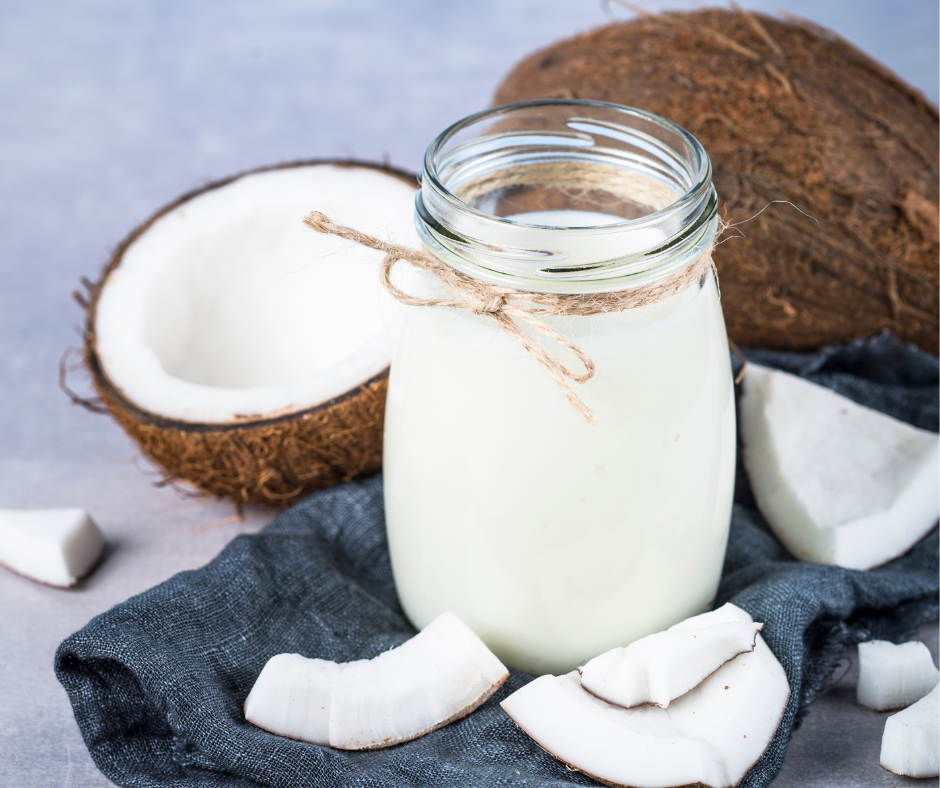The Health Benefits of Coconut Milk: A Nutritious and Versatile Superfood
 Introduction:
Introduction:
Coconut milk is a delicious and nutritious food that offers a range of health benefits. Whether you enjoy it as a beverage, use it in cooking, or incorporate it into your favourite recipes, coconut milk is a versatile ingredient that can enhance your overall well-being. In this article, we will explore the top five health benefits of coconut milk and compare it to other plant-based milk alternatives. Additionally, we will delve into its suitability for individuals with specific dietary needs and highlight its potential in supporting liver health.
- Contains Medium-Chain Fatty Acids: One of the key health benefits of coconut milk is its high content of medium-chain fatty acids (MCFAs). Unlike long-chain fatty acids found in other fats and oils, MCFAs are quickly metabolized and can be used as a readily available source of energy. These fatty acids, such as lauric acid, have been associated with various health benefits, including improved brain function, increased satiety, and enhanced weight management.
- Lactose-Free Alternative: For individuals with lactose intolerance or dairy allergies, coconut milk serves as an excellent lactose-free alternative to cow’s milk. Coconut milk can be enjoyed by those who experience digestive discomfort or adverse reactions to lactose, making it a suitable choice for individuals seeking non-dairy options.
- Anti-Inflammatory, Anti-Microbial, and Anti-Fungal Properties: Coconut milk contains several bioactive compounds that possess anti-inflammatory, anti-microbial, and anti-fungal properties. These properties can help combat inflammation, support the immune system, and promote overall health. Lauric acid, found abundantly in coconut milk, exhibits antimicrobial properties and has been shown to combat harmful bacteria, viruses, and fungi.
- Support for Cardiovascular Health: Regular consumption of moderate amounts of coconut milk may offer potential cardiovascular benefits. The MCFAs present in coconut milk have been associated with increasing levels of high-density lipoprotein (HDL) cholesterol, also known as “good” cholesterol. HDL cholesterol helps remove low-density lipoprotein (LDL) cholesterol, often referred to as “bad” cholesterol, from the bloodstream, thus promoting heart health.
- Potential Reduction of Stomach Ulcers: Coconut milk may provide relief for individuals suffering from stomach ulcers. The natural compounds in coconut milk have been found to possess gastroprotective properties, which means they can help protect the stomach lining against ulcer formation. This soothing effect on the stomach may alleviate discomfort and promote the healing of existing ulcers.
Comparing Almond Milk and Coconut Milk:
When considering plant-based milk alternatives, both almond milk and coconut milk have their merits. Almond milk is the lower-calorie option, making it preferable for individuals who are watching their calorie intake. Additionally, almond milk offers a healthier fat profile, making it a suitable choice for those concerned about fat content. On the other hand, coconut milk provides a unique flavor profile, and its richness can enhance the taste of various dishes and desserts. Furthermore, coconut milk serves as an excellent substitute for dairy milk in baking, as it can be used in a one-to-one ratio without any conversions required.
Supporting Liver Health:
Coconuts, including coconut milk, can contribute to liver health due to their medium-chain triglycerides (MCTs) content. MCTs aid in liver detoxification by providing immediate energy and reducing the accumulation of toxins in the bloodstream, which can otherwise lead to liver damage. Compared to other detox products, coconuts offer a safer and natural option for promoting liver health.
Conclusion:
Incorporating coconut milk into your diet can bring a multitude of health benefits. With its medium-chain fatty acids, anti-inflammatory properties, and potential positive effects on cardiovascular health and stomach ulcers, coconut milk proves to be a versatile and nutritious addition to your meals. While almond milk may be the lower-calorie option with a healthier fat profile, coconut milk shines in its culinary applications, especially as a dairy substitute in baking. Furthermore, the MCTs present in coconut milk contribute to liver detoxification, making it a valuable ally in supporting liver health. Embrace the many benefits of coconut milk and enjoy its delicious flavor while nourishing your body.
